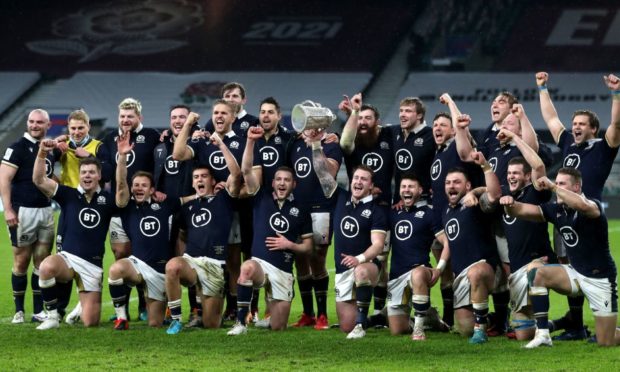Scotland’s rugby players helped lift the nation with their tremendous victory over England in the Calcutta Cup.
At a stroke, they not only demonstrated with a powerful passionate display that they had built on the improvement in last year’s Six Nations Championship, but emphasised there is no reason why Gregor Townsend’s men can’t be in a position to win the tournament when they welcome hapless, hopeless Italy to Murrayfield next month.
That’s not being excessively optimistic on the evidence of the first weekend’s action. Wales, who are toiling badly since the departure of Warren Gatland made very hard work of beating 14-man Ireland, while the Italians were on the receiving end of another trouncing from the French as they continue their trek along the Via Dolorosa.
The French moved through the gears with effortless precision and deserve to be favourites at this stage, but I’m confident the Scots can now achieve four victories, which might be enough when you consider that Les Bleus have to travel to Twickenham against an England line-up who will – make no mistake about it – be significantly better in their future contests once Eddie Jones has gone through them like a dose of salts.
Yet, for all the praise which was rightly lavished on Stuart Hogg, Finn Russell, George Turner, Hamish Watson and their counterparts in blue, Saturday’s tussle did leave me wondering about the lack of diversity in the Scottish set-up.
You can argue both ways about the merits of players “taking the knee “ at these high-profile occasions – and there has been plenty of criticism of the fact only four of Townsend’s team in the guise of debutant Cameron Redpath, Chris Harris, Ali Price and Jonny Gray responded in this fashion to the Rugby against Racism initiative.
But the bigger issue is surely the lack of black, Asian and other ethnic minorities coming through the ranks as one might expect would have happened in the current climate, where sports governing bodies make a virtue of talking about promoting inclusivity.
Cricket and hockey have led the way on this issue and the north-east Grades circuit would be in desperate shape without the sterling work carried out by so many Asian members who brought a plethora of different qualities to the game for many decades.
Sadly, though, the same cannot be said of rugby and I had an informative chat with leading Scottish lawyer and the firmer Rector of Glasgow University, Aamer Anwar, about his response to the first Scottish triumph at Twickenham in 38 years.
He told me: “The ‘taking of the knee’ began as an act of protest against racial inequality, violence and murder and many around the world who have kneeled down have done so in gestures of unity and respect.
“I don’t think it’s helpful to force anyone to take the knee, but what I found astonishing was the bile directed at those players who took the knee, combined with a denial of racism being an issue.
“Football, as Scotland’s truly national sport, has had huge problems with racism, but there have also been real attempts to tackle it in recent times. To be blunt, Scottish Rugby hasn’t really bothered with anti-racism because it’s not their problem.
“I, for one, am proud of the four Scottish players who chose to take the knee, but the debate needs to focus on the fact that BAME [Black, Asian and Minority Ethnic] communities are practically non-existent in Scottish rugby and racism remains an issue on and off the playing fields here.”
The Scottish Rugby Union has recognised the need to bring down barriers to participation throughout the country and they have insisted they “are committed to developing processes, practices and plans to ensure it is open to all.”
However, Anwar is among those who believe such statements are, in themselves, meaningless without greater investment in the whole grassroots circuit.
He added: “The SRU may have had a diversity action plan since 2018, but we have seen negligible results to date, and I think the sport remains in essence all white.
“Maybe the good thing about this historic victory over England is that it also exposed that rugby and our international team does not reflect the Scotland they claim to represent in 2021. Until it does, many of us won’t be using the hashtag ‘#AsOne”.
These are string words, but while Scotland’s players produced a massive pick-me-up for supporters who have too long been fed a diet of dross, Anwar’s comments reflect one of the more obvious problems with the make-up of Townsend’s squad.
In 2018, many of us cheered when Safyaan Sharif trapped Mark Wood lbw to seal Scottish cricket’s unprecedented win against England in Edinburgh. It was a wonderful moment from a team which highlighted all the positive traits of multi-ethnic sport.
It would be good to imagine something similar occurring in rugby a decade from now.
